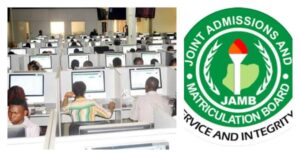In January 2025, the Nigerian National Assembly raised concerns over the Joint Admissions and Matriculation Board’s (JAMB) proposed budget allocations for the year.
Lawmakers questioned the necessity and scale of certain expenditures, notably N1.1 billion earmarked for staff meals and N850 million designated for security, cleaning, and fumigation services. These figures sparked a nationwide debate on public sector spending and resource management.
The National Assembly’s Concerns
During a budget defense session, members of the National Assembly’s Joint Committee on Finance scrutinized JAMB’s proposed 2025 budget. Chairman Abiodun Faleke expressed surprise that JAMB, a revenue-generating agency, was still receiving substantial government funding. He pointed out that while JAMB remitted N4 billion to the Consolidated Revenue Fund in 2024, it received a N6 billion grant from the federal government. Faleke questioned the logic behind this arrangement, suggesting that JAMB could retain its earnings and operate without additional government allocations.
Senator Adams Oshiomhole further criticized specific budgetary allocations. He highlighted the N1.1 billion planned for meals and refreshments, questioning the justification for such an amount. Oshiomhole emphasized that these funds are generated from students, many of whom come from underprivileged backgrounds, and suggested that the expenditure seemed excessive. Additionally, he questioned the N850 million set aside for security, cleaning, and fumigation, humorously asking if “mosquitoes took all this money.”
JAMB’s Justification
In response to the National Assembly’s concerns, JAMB provided detailed explanations for the contested budget items. Dr. Fabian Benjamin, JAMB’s spokesperson, clarified that the figures in question were part of the 2025 budget proposal, not expenditures from 2024. He emphasized that the proposed allocations were designed to enhance operational efficiency and staff welfare.
Regarding the N1.1 billion allocated for staff meals, JAMB explained that this provision aimed to supply one meal per day to its 2,300 staff members nationwide, including cleaners and security personnel. The initiative, which began at the headquarters, was intended to minimize staff exposure to external environments during working hours and to protect sensitive ICT infrastructure from potential hazards associated with eating at workstations. Due to rising food prices, the cost per meal had increased from N1,200 to N2,200, leading to the projected annual total.
The N850 million designated for security, cleaning, and fumigation was also addressed. JAMB clarified that this amount covered the salaries of 386 security personnel and 194 cleaners across over 40 offices and Professional Test Centers (PTCs) nationwide. The allocation also included costs for cleaning materials and a modest N2 million specifically for fumigation services. This budgeting was in line with government policies on outsourcing, ensuring that non-core functions were managed by external firms.
National Assembly’s Reassessment
Following JAMB’s clarifications and a thorough review of the submitted documents, the National Assembly Joint Committee on Finance reassessed its initial stance. Chairman Sani Musa acknowledged that the earlier allegations of financial mismanagement were unfounded. He commended JAMB for its prudent use of resources under the leadership of Registrar Professor Is-haq Oloyede, highlighting the board’s commitment to financial discipline and accountability.
Public and Staff Reactions
The discourse surrounding JAMB’s budget allocations extended beyond the halls of the National Assembly, capturing public attention and prompting discussions on social media and other platforms. Many Nigerians expressed concerns about the scale of the proposed expenditures, especially in a country where resources are limited, and many citizens face economic hardships.
Within JAMB, staff members, represented by the National Association of Non-Academic Staff Union (NASU), defended the budgetary provisions. Andrew Onakpa, chairman of the NASU branch at JAMB, emphasized that the meal initiative was a collective decision aimed at improving staff welfare. He noted that the provision of daily meals had been in place at the headquarters and that extending it to all offices nationwide was a response to consistent requests from staff. Onakpa lauded Professor Oloyede’s leadership, describing his attention to staff welfare as humane and beneficial.
Conclusion
The scrutiny of JAMB’s proposed budget allocations for 2025 underscores the importance of transparency and accountability in public sector spending. While initial reactions from the National Assembly highlighted concerns over perceived excessive expenditures, subsequent clarifications provided by JAMB offered context and justification for the budgetary decisions.
This episode serves as a reminder of the need for open dialogue between government agencies and oversight bodies to ensure that public funds are managed responsibly and in the best interest of all stakeholders.
FAQs
-
Why did JAMB allocate N1.1 billion for staff meals in 2025?
JAMB proposed this allocation to provide one meal per day to its 2,300 staff members nationwide. The initiative aims to minimize staff exposure to external environments during working hours and protect sensitive ICT infrastructure. The increase in food prices led to a rise in the cost per meal, resulting in the projected annual total.
-
What does the N850 million budget for security, cleaning, and fumigation cover?
This allocation includes salaries for 386 security personnel and 194 cleaners across over 40 offices and Professional Test Centers nationwide. It also covers costs for cleaning materials and a modest N2 million specifically earmarked for fumigation services.
-
How did the National Assembly respond to JAMB’s budget clarifications?
After reviewing JAMB’s detailed explanations and submitted documents, the National Assembly Joint Committee on Finance acknowledged that the initial allegations of financial mismanagement were unfounded. The committee
